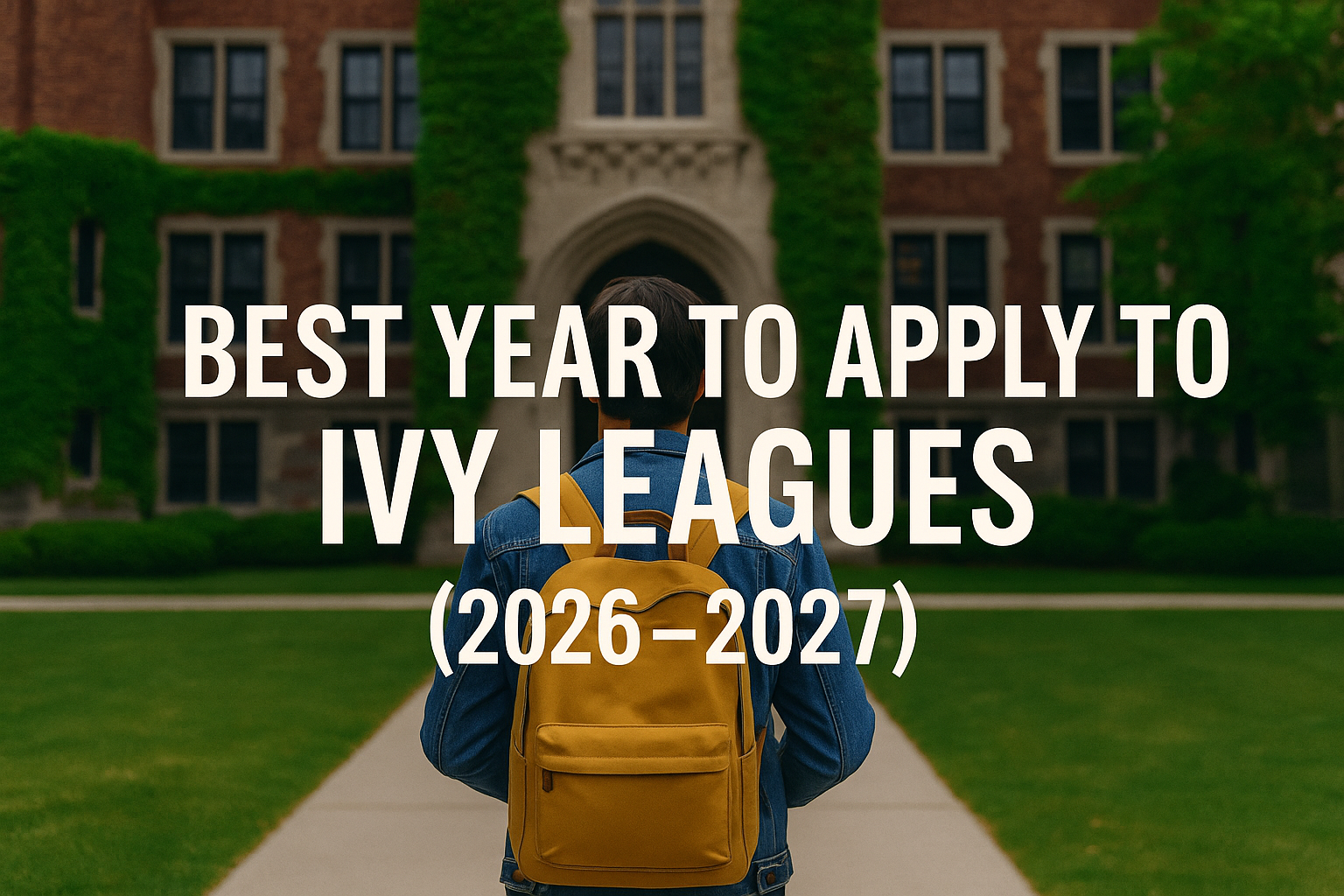- Leave a Comment
- September 27 2025
- College Applications
- By vanguard
Why 2026–2027 May Be a Prime Moment to Apply to Ivy Leagues
When you hear “Ivy League,” most people think of ultra-competitive admissions, hundreds of thousands of hopefuls, and single-digit acceptance rates. And that’s still largely true. But currents are shifting—and one of these shifts may open a narrow window of opportunity for applicants who act smartly and prepare early.
Here’s why I believe the coming year could be one of the best times in recent years to apply to Ivy League universities—and how to make the most of it.
1. Application volume is cooling off (in some places)
One of the biggest factors working in favor of applicants right now is that many top schools are seeing fewer applications in certain cycles, after years of relentless growth.
- Several Ivy League institutions have reinstated standardized test requirements (after being test-optional during the pandemic), which appears to be influencing application behavior.
- Some selective colleges more broadly—especially ones that reinstated tests—report application volume declines of 10% or more.
- Specific data: Yale saw a 12.6% drop in applications year-over-year; Brown dropped ~12%, Dartmouth ~10.8%.
When fewer students apply, the “supply” side of admissions loosens slightly—if you’re a strong, well-rounded candidate, your relative position in the applicant pool might improve.
2. Slight upticks in acceptance rates offer hope
It’s still extremely competitive, but admissions data is showing some softening of the downward pressure.
- For the Class of 2029, several Ivy League schools reported that their acceptance rates rose slightly compared to the previous cycle.
- Some analysts attribute this shift to the fact that candidates are self-selecting out when test scores are required again.
So while Ivy League admissions will never be “easy,” the lines are not as inflexible as many assume—and a shrinking applicant pool might widen a crack.
3. Why these changes are happening now
It’s not just luck—there are structural shifts causing this moment to stand out. Some of the drivers:
|
Factor |
Effect on Applicants |
|
Reinstatement of test requirements |
Some students who were comfortable applying test-optional may now hesitate, reducing the size of applicant pools. |
|
Admissions fatigue & overapplication strategy |
Many students apply to dozens of schools; when they perceive less payoff, they may trim their lists. |
|
Rethink of “elite institution” priorities |
More students are evaluating return-on-investment, campus culture, and mission alignment—some may opt for strong non-Ivy alternatives. |
Because of these, the “margin” in admissions (i.e. those just on the bubble) may shift in your favor, if you prepare smartly.
4. What makes a “right” application in this environment
If this is your moment, you’ll want to seize it. But luck favors the well-prepared. Here are key strategies:
- Prepare for tests (if required). With test requirements returning, a solid SAT or ACT (never both) is again a major differentiator.
- Tell compelling stories. As applicant volume shrinks, admissions officers will look more closely at the narrative, voice, fit, and authenticity of your essays.
-
- This means don't use AI to write your essays! That will ensure your application gets a quick trip tot he garbage bin.
- This means don't use AI to write your essays! That will ensure your application gets a quick trip tot he garbage bin.
-
- Show deep commitment and focus. Quality over quantity: meaningful extracurriculars and leadership matter more than a long list of superficial activities. Specialty is key now—not being well rounded.
- Highlight alignment. Schools want students who align with their mission, values, and communities.
- Apply early where possible. Early decision or early action may still offer slightly better odds if you have a strong profile and truly want one school above all.
- Build a balanced list. Don’t put all your hope on Ivies—include strong matches and safeties that reflect your goals, finances, and preferences.
5. Risks, caveats, and realistic expectations
To be clear: this is not a guarantee of admission. There are still significant constraints and risks:
- Even in cycles with fewer applications, acceptance rates remain extremely low—many Ivies report < 5% admit rates.
- You’re competing with many other highly capable students who also sense the opportunity and invest heavily in their applications.
- Institutional priorities, demographics, and legacy preferences still matter—some decisions are out of individual control.
- The decline in applications may not be uniform across all Ivies; each school’s applicant pool may behave differently.
6. How Vanguard College Prep Can Help
At moments like these, strategy and preparation matter more than ever. This is where Vanguard College Prep comes in.
We specialize in helping high-achieving students navigate the shifting admissions landscape by:
- Building Ivy-ready narratives. Our essay specialists help craft authentic, compelling stories that stand out in smaller applicant pools.
- Maximizing test performance. With targeted SAT/ACT prep rooted in fundamentals, we ensure students are not caught off guard by the return of testing requirements.
- Strategic application planning. From Early Decision strategies to building balanced lists, we tailor each student’s roadmap to capitalize on this unique cycle.
- Holistic academic coaching. Beyond test prep, we strengthen core skills that benefit students across high school and college—making them stronger applicants and stronger learners.
In a year where fewer students may apply, those who prepare with intention can set themselves apart. Vanguard gives you the structure, expertise, and edge to do just that.
Conclusion: Don’t Miss This Window
The Ivy League will always be competitive. But the reality is that some years are slightly more favorable than others—and the 2026–2027 cycle may well be one of them. If you’ve been considering aiming for the Ivies, this could be your chance to step forward with confidence.
And you don’t have to do it alone. Vanguard College Prep is here to guide you through every step of the process.
Vanguard College Prep



Leave Your Comment